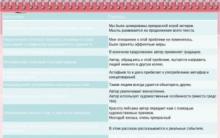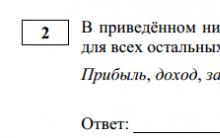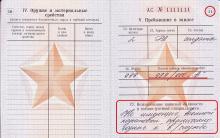Separating add-ons
Hello guys!
Write down the date and topic of the lesson in your notebook.
During the lesson, you will remember the rules for isolating additions, consolidate the ability to find isolated additions in a sentence, and distinguish them from isolated definitions. Practice placing punctuation marks in sentences with additions.
Watch the video tutorial carefully.
Write it down in your linguistic notebook (for those who didn’t write it down in class).
| Rule | Example |
|
1. Usually clarifying additions with prepositions are isolated except, instead of, besides, including, excluding, over, along with, in differences from and others with the meaning of exclusion, addition, substitution, distinction. |
Instead of shaved cheekbones, he now hadgoatee. |
|
2. The isolation of additions is associated with their prevalence, emphasizing their role by the author.Ifinstead of = for, no separation. The qualifying and qualifying words can be different parts of the sentence. |
At the outpost, instead of a sentry, there was a collapsed booth. |
| 3 Clarifying additions can be separated usingdash (author's - highlight for some reason). |
Everyone - with the exception of the guilty - was severely punished. |
Read more about cases of isolating complements with prepositions >>
Exercise 1.
Place punctuation marks. Emphasize grammatical basics and special additions.
1) Lisa along with everyone elseI had to look for a service. 2) The entire field is overgrown with bushes except for a small clearing. 3) Many of the fighters, in addition to their rifles, werearmed with captured machine guns. 4) Instead of a coat, he put on a jacket. 5) Unlike his strong grandfather, my father looked frail and sickly.
Exercise 2.
Divide the notebook paper into two columns.
Determine which part of the sentence is isolated and write it in the appropriate column.
While hunting, Uncle Eroshka ate one piece of bread for days and drank nothing but water. (L. Tolstoy.) 2) Instead of answering some request, he [Zurin] wheezed and whistled. (A. Pushkin.) 3) He, with his intelligence and experience, could have already noticed that she was marking him. (A. Pushkin.) 4) Beyond Grigoriev’s expectations, the gunfire did not cause noticeable confusion in the ranks of the Reds. (M. Sholokhov.) 5) Surprised, he even almost stopped. (I. Bunin.) 6) Everyone, with the exception of Varya, loudly applauded the singers. (A. Stepanov.)
Underline the isolated parts of the sentence.
Test
Separating add-ons
Testing knowledge on the topic.
Russian language 8th grade | Date: 03/23/2014 | Questions: 10 |
The separation of applications, as well as definitions, depends on several factors:
a) from the part of speech of the defined (main) word;
b) from the position of the application in relation to the defined (main) word - before the main word, after the main word;
c) from the presence of additional shades of meaning in the application (adverbial, explanatory);
d) on the degree of distribution and method of expression of the application.
Conditions for segregating applications
A) The word being defined is a pronoun
Any application with a personal pronoun is isolated:
Is it him? dwarf, compete with a giant?(Pushkin); Here it, explanation (L. Tolstoy).
B) The word being defined is a noun
1. An application relating to a proper name is isolated if it appears after the word being defined:
Sergey Nikanorych, bartender, poured five glasses of tea(Chekhov).
Before a proper name, the application is isolated only if it has an additional adverbial meaning. Such an application can be replaced by a subordinate clause with conjunctions since, although etc.
For example:
1. Stubborn in everything, Ilya Matveevich remained stubborn in his studies(Kochetov). - Since Ilya Matveevich was stubborn in everything, he remained stubborn in his studies.
2. Renowned Scout, Travkin remained the same quiet and modest young man as he was when they first met(Kazakevich). - Although Travkin was a famous intelligence officer, he remained the same quiet and modest young man as he was when they first met.
2. An appendix - a proper name (the name of a person or the name of an animal) with a defined word - a common noun is isolated if such an appendix comes after the defined word and has an explanatory meaning (you can put the words in front of it namely, that is, and his name is):
aunt, Ksenia Frolovna Gorina (Peskov). - Lyubina occasionally inserts a word into the conversation. aunt, and her name is Ksenia Frolovna Gorina.
Note. In many cases, double punctuation is possible, depending on the presence or absence of an explanatory connotation of meaning and the corresponding intonation when reading.
Wed: One of my friends, Seryozha, decided to go to university(explains which friend decided to go to university). - My friend Seryozha decided to go to university(there is no such explanation in this context, and it is the proper name that is in this case the defined word, and the common noun is the application).
3. A common application expressed by a common noun with dependent words, or several homogeneous applications with a defined word - a common noun is usually isolated regardless of the position - before or after the defined word. However, most often such an application comes after a noun.
For example:
1. Old woman, Grishka's mother, died, but old people, father and father-in-law, were still alive(Saltykov-Shchedrin).
2. Misfortune's faithful sister, hope in a gloomy dungeon will awaken cheerfulness and fun(Pushkin).
4. A single application - a common noun with a defined word - a common noun is isolated only when:
- the application comes after the word being defined;
- The defined noun has explanatory words with it.
Isolation of a single application - a common noun from a single defined word - a common noun is possible only if the author wants to strengthen the semantic role of the application, to prevent it from merging intonationally with the word being defined:
Father, drunkard, fed from an early age, and herself(M. Gorky).
5. An application with a conjunction, as usual, has the additional meaning of causality (can be replaced by a subordinate clause of cause with conjunctions since, because, since or a turn of phrase being) and is separated:
Like an old artilleryman, I despise this type of edged weapon(Sholokhov). - Being an old artilleryman, I despise this type of edged weapon; I despise this kind of bladed weapon, because I'm an old artilleryman.
If a phrase with the conjunction as has the meaning “as”, then the attached phrase is not isolated:
The received response is considered as consent. - The received response is considered as consent.
6. Applications with words by name, by surname, by nickname, by birth etc. are isolated if pronounced with the intonation of isolation.
Wed: Ermolai had a cop dog, nicknamed Valetka (Turgenev). - The class teacher, nicknamed Trumpet no one loved(Trifonov).
Note!
Instead of a comma when separating applications, a dash can be used in the following cases:
1) if before the application you can insert namely without changing the meaning (especially if the application is at the end of the sentence, has dependent words and there are already punctuation marks inside it).
In the far corner there was a yellow glow spot - fire in the window of Serafima's apartment, attached to the wall of the stable (M. Gorky);
2) if a single or widespread application is at the end of the sentence and its independence is emphasized or an explanation of such an application is given.
I don't like it too much tree - aspen (Turgenev); In the corner of the living room stood a pot-bellied bureau on absurd four legs - perfect bear (Gogol);
3) if the application is in the middle of a sentence and is explanatory in nature (a dash is placed on both sides).
Somewhat unnatural greenery - the creation of boring incessant rains- covering fields and fields with a liquid network(Gogol).
Note. The second dash is omitted:
a) if a comma is placed after a separate application, for example: Using a special device - pedometer, I calculated the optimal load for my body(Vasiliev);
b) if the application expresses a more specific meaning, and the preceding qualified word expresses a more general meaning, for example: At the meeting ministers of foreign affairs - members of the G8 Russian Foreign Minister spoke;
c) if the application precedes the word being defined, for example: One of the outsiders Russian Football Championship- team Saratova unexpectedly won two games in a row.
Isolation is the punctuation and intonation highlighting of any member of a sentence. In writing, the secondary members of the sentence are highlighted. Let's consider cases of isolation of additions.
Additions expressed nouns with prepositions , can be attached to the main word (most often a predicate verb) using prepositions except, instead of, apart from, over, except for, along with s and others with the meaning:
inclusions,
exceptions,
substitution, i.e. restrictive or expansive meaning.
Squad, except for three or four people, as usual, broke up into groups.
Objects expressed by a noun with prepositions over, besides, except for, outfit at s, etc., stand out intonationally in speech, and in writing, in at the beginning and at the end of a sentence, may become isolated comma.
Besides books , there were papers and pens on the table.
Beyond all expectations , my son showed good results on the Unified State Exam.
Complements expressed by a noun with a preposition except, are isolated.
There was no other furniture in the house, except chair, table and couch.
Turnover with preposition except may also matter exceptions, and value inclusions:
Except the hostess , there was no one in the hut.- Meaning exceptions: the hostess was there, but no one else was there.
Except pieces of bark There were bundles of dry herbs and roots on the table.- Meaning inclusion: everything listed was on the table.
Usually turnover is not separated with a pretext except with the meaning of inclusion in sentences where there is tight semantic connection between components.
Except basic spells, other information important for witchcraft was written down in the book.
Turnover Besides in meaning introductory combinations always stand out commas:
Baba Yaga remembered all the spells by heart for a long time, besides, she lost the book a long time ago.
Turnover with preposition instead of may include nouns denoting actions and objects. In the first case, the turnover is always separated by commas:
Instead of an answer , Baga Yaga held out a pine cone.
In the second case separation not necessary:
Instead of In the familiar forest, Baba Yaga saw an impenetrable dark thicket.
If the pretext instead of has the meaning "for", "in return" then the turnover with him is usually not isolated:
Instead of Baba Yaga's guard dog had a feisty black cat.
Instead of felt boots He pulled his gloves over his heels.
Bibliography
- Bagryantseva V.A., Bolycheva E.M., Galaktionova I.V., Litnevskaya E.I. and others. Russian language.
- Barkhudarov. S.G., Kryuchkov S.E., Maksimov L.Yu., Cheshko L.A. Russian language.
- All about complicated sentences ().
- Punctuation marks for isolated additions ().
- Exercises ().
- Tests ().
- Rosenthal D.E. and others. Directory. ().
- Complete academic reference book edited by V.V. Lopatina ().
- Presentation "Separate additions" ().
Homework
Exercise: Place punctuation marks based on the rule for separating additions.
- Apart from a few willow trees, always ready to serve, and two or three skinny birches, we will see nothing.
- My father didn’t know anything other than French spelling.
- In addition to the daytime predators of eagles, hawks and falcons, various nocturnal eagle owls and owls also live in our forests.
- The editor listened to him and smiled against his will.
- Instead of bare cliffs, I saw green mountains and trees around me.
- In the back room of the house, damp and cold, on a wretched bed covered with a shaggy cloak with a blanket instead of a pillow, Tchertop-hanov was no longer pale, but yellow-green.
- To Kashtanka’s great surprise, the carpenter, instead of being frightened, stretched out to the front and put all his fingers under the visor.
- I was already beginning to think that there was no other place for me except literature.
- The words that gave rise to our quarrel seemed even more vile to me when, instead of obscene ridicule, I saw in them deliberate slander.
- With the exception of a few minor shortcomings, Polutykin was an excellent person.
Revolutions (clarifying additions) with prepositions except, despite, besides, instead of, excluding, including, along with, contrary to, over, even, except for, in the presence of, that is, or (in the meaning “that is”) and others always are isolated and separated by a comma: No one except Natasha could console the grief-stricken countess. Despite the difference in character and the apparent severity of Artyom, the brothers loved each other deeply. In addition to his handsome and pleasant appearance, he had good manners. (L.T.)
The isolation of common circumstances with prepositions thanks to, as a result of, in view of, in the presence of, on condition of, in spite of, according to, for the reason of is optional and depends on the degree of prevalence of the sentences and on the purpose, speech task of the author of the statement.
Table 9 - Isolation of circumstances expressed by gerunds
|
1 Separated by commas |
|
|
Participles with dependent words (adverbial phrase), as well as several participles related to one verb, regardless of place: |
Returning home, he threw himself on the bed without undressing and fell fast asleep. (P.). Sparkling and sparkling, frost fell from the trees. She sat with her bare arms folded in a cross, her head, still adorned with flowers, bowed on her open chest. (P.) |
|
Singles (if they do not have the meaning of an adverb, they can be replaced with verbs): |
After talking, they parted (they talked and parted) |
|
2 There is no comma |
|
|
If gerunds with dependent words have turned into stable combinations: |
They worked with their sleeves rolled up. A little later it started to rain. |
|
For single participles that have the meaning of an adverb and are adjacent directly to the predicate (they can be replaced with another adverb): |
We walked in silence (quietly). The baby ate slowly (slowly). The dead old woman sat petrified; her face expressed deep calm. (P.) |
|
With single participles acting as adverbs. Such participles turn into adverbs and are not isolated in any position: |
|
|
Between gerunds and participial phrases connected by conjunctions and, or, a: |
Having fallen and become very dirty, the child cried loudly. |
Table 10 - Isolation of clarifying and explanatory members of the sentence, phrases with the meaning of exclusion, inclusion, substitution
|
Clarifying (the sentence must necessarily contain two homogeneous adverbs of place or time, then the second, clarifying circumstance is isolated) |
separated by commas:
|
|
Explanatory (denote the same concept, but call it differently) |
|
|
Revolutions with the meaning of exclusion, inclusion and substitution |
|











Decursive interest calculation
Corporate treasury organization
What does Kystyby mean? Dough for kystyby
Contraindications for beet juice
Weekly horoscope: Love adventures await Scorpios